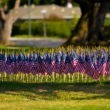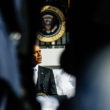Suicide bombings have dominated recent news reports from Iraq, but reporters have paid less attention to explosive political and sectarian forces that threaten to tear the country apart. Since the last U.S. combat troops left Iraq in December, rival members of Prime Minister Nouri al-Maliki’s governing coalition have been maneuvering to replace him.
Removing a prime minister requires 164 votes in Iraq’s 325-member parliament; at most, say observers, the opposition might rustle up 150 votes.
And the opposition’s internal divisions and lack of an agreed-upon replacement for Maliki give him room to sow dissent among them, consolidate his power, and cripple his main threat, the Iraqiya party.
Yet Maliki is far from secure. Iraqiya, while divided and suffering the loss of Vice President Tariq al-Hashemi — who fled to Turkey to escape charges of running death squads — continues to lobby for Maliki’s removal. The Kurds in northern Iraq are moving toward independence by pursuing independent oil deals and building a separate oil pipeline. Populist Shia cleric Muqtada Sadr, currently part of the unity government, has been threatening to withdraw support.
Many Sunnis and Kurds, and some Shia, in Maliki’s coalition view him as a dictator unwilling to share powers guaranteed by the constitution. He has taken control of the interior and defense ministries, and put Hashemi on trial in absentia.
“This was an effort by Maliki to neuter a political rival,” says Marisa O’Sullivan, an Iraq expert at the Institute for the Study of War.
Yet the Obama administration has few options left other than to support Maliki, while prodding him to act like a democrat and stick to the timeline for parliamentary and presidential elections in 2013 and 2014.
A further weakened Maliki increases the prospect of geographical, as well as political, division. For years, Iraqis have fought over oil, territory claimed by both Arabs and Kurds, and provincial self-rule, which the Kurdish-dominated provinces in the north have and other Iraqis may decide they want.
Of late, self-rule — or “federalism”— has caused the most tension, as several potential breakaway provinces have used it to signal their anger with Maliki’s policies. Federalism is the right of any province to declare autonomy by a majority vote of the provincial council, followed by a public referendum on the question.
In October, Salah ed-Din province initiated the autonomy process; in December, Diyala province followed suit. Anbar and Ninewa provinces have threatened to vote for semi-independence. All four are in Iraq’s Sunni-dominated northern and western areas — big swaths of support for Iraqiya — and border on the already semi-autonomous Kurdistan region.
The votes are a threat to Maliki’s power and to Iraq remaining intact. Before Maliki drove him from the country, Hashemi championed the autonomy bids, then reportedly went a step further, calling on the oilrich southern Basrah province to declare autonomy. The timing of the moves toward autonomy came just as the Kurds, who have been pushing to increase their regional government’s power, signed a deal with ExxonMobil in October that included oil fields in disputed territory.
The campaign for autonomy is also a response to Maliki’s efforts to consolidate control in the hands of the central government. Provincial leaders consider autonomy a safeguard against Maliki’s increasing authoritarianism.
Leaders in Salah ed-Din and Diyala have long been fed up with Maliki, particularly since his Shia-dominated coalition began arresting prominent Sunnis in these provinces (and others) under the guise of rooting out former Baathists. The arrests have broadened to include Shia supporters of Iraqiya, but Sunnis view the arrests in sectarian terms.
In April, several parties in Maliki’s coalition gave him 15 days to comply with a list of demands or face a vote of no confidence. The list included improved public services and continued electoral-commission independence, but mainly reiterated demands that Iraqi parties have been making for years. The threat passed without a no-confidence vote.
Experts I’ve talked to doubt the tensions will lead in the short term to the kind of fighting that peaked in 2007, instead predicting a continued freeze of the system so that nothing gets done and Maliki remains in power, weakened by a dysfunctional coalition but holding on in the absence of a viable alternative.
But the outstanding issues of oil, territory, and federalism remain. Iraqis view them as zero-sum conflicts that offer little room for compromise on issues that each group is willing to fight for. Maliki’s recent trip to Kirkuk province, an ethnically mixed area of northern Iraq, accompanied by military vehicles, underscored the precariousness of his situation.
Kirkuk was the only province not to vote in provincial elections in 2005, and it reads like a microcosm of the fragmenting country. There was no vote because there was no census. There was no census because Arabs and Kurds refused to acknowledge the other side’s presence in the province. Counting distinct populations was simply too explosive.
The bottom line is that Iraq’s most serious issues have not been dealt with, nor are they likely to be any time soon, most likely because they cannot be peacefully resolved.
Deborah Horan covered the Middle East for a decade and reported on the war in Iraq in 2003 and 2004.
Further reading on Iraq in this issue of the Spectator: “Romney’s Anti-Muslim Arab.”






0 Comments